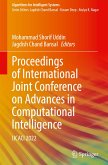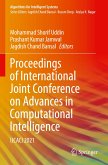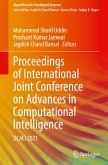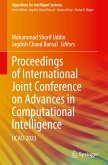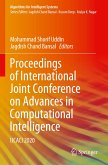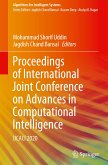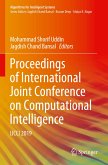Proceedings of International Joint Conference on Advances in Computational Intelligence
IJCACI 2022
Herausgegeben:Uddin, Mohammad Shorif; Bansal, Jagdish Chand
Proceedings of International Joint Conference on Advances in Computational Intelligence
IJCACI 2022
Herausgegeben:Uddin, Mohammad Shorif; Bansal, Jagdish Chand
- Broschiertes Buch
- Merkliste
- Auf die Merkliste
- Bewerten Bewerten
- Teilen
- Produkt teilen
- Produkterinnerung
- Produkterinnerung
This book gathers outstanding research papers presented at the 6th International Joint Conference on Advances in Computational Intelligence (IJCACI 2022), held in hybrid mode during October 15 - 16, 2022. IJCACI 2022 is jointly organized by Jahangirnagar University (JU), Bangladesh and South Asian University (SAU), India. The book presents the novel contributions in areas of computational intelligence and it serves as a reference material for advance research. The topics covered are collective intelligence, soft computing, optimization, cloud computing, machine learning, intelligent software,…mehr
Andere Kunden interessierten sich auch für
![Proceedings of International Joint Conference on Advances in Computational Intelligence Proceedings of International Joint Conference on Advances in Computational Intelligence]() Proceedings of International Joint Conference on Advances in Computational Intelligence231,99 €
Proceedings of International Joint Conference on Advances in Computational Intelligence231,99 €![Proceedings of International Joint Conference on Advances in Computational Intelligence Proceedings of International Joint Conference on Advances in Computational Intelligence]() Proceedings of International Joint Conference on Advances in Computational Intelligence216,99 €
Proceedings of International Joint Conference on Advances in Computational Intelligence216,99 €![Proceedings of International Joint Conference on Advances in Computational Intelligence Proceedings of International Joint Conference on Advances in Computational Intelligence]() Proceedings of International Joint Conference on Advances in Computational Intelligence216,99 €
Proceedings of International Joint Conference on Advances in Computational Intelligence216,99 €![Proceedings of International Joint Conference on Advances in Computational Intelligence Proceedings of International Joint Conference on Advances in Computational Intelligence]() Proceedings of International Joint Conference on Advances in Computational Intelligence217,99 €
Proceedings of International Joint Conference on Advances in Computational Intelligence217,99 €![Proceedings of International Joint Conference on Advances in Computational Intelligence Proceedings of International Joint Conference on Advances in Computational Intelligence]() Proceedings of International Joint Conference on Advances in Computational Intelligence154,99 €
Proceedings of International Joint Conference on Advances in Computational Intelligence154,99 €![Proceedings of International Joint Conference on Advances in Computational Intelligence Proceedings of International Joint Conference on Advances in Computational Intelligence]() Proceedings of International Joint Conference on Advances in Computational Intelligence154,99 €
Proceedings of International Joint Conference on Advances in Computational Intelligence154,99 €![Proceedings of International Joint Conference on Computational Intelligence Proceedings of International Joint Conference on Computational Intelligence]() Proceedings of International Joint Conference on Computational Intelligence154,99 €
Proceedings of International Joint Conference on Computational Intelligence154,99 €-
-
-
This book gathers outstanding research papers presented at the 6th International Joint Conference on Advances in Computational Intelligence (IJCACI 2022), held in hybrid mode during October 15 - 16, 2022. IJCACI 2022 is jointly organized by Jahangirnagar University (JU), Bangladesh and South Asian University (SAU), India. The book presents the novel contributions in areas of computational intelligence and it serves as a reference material for advance research. The topics covered are collective intelligence, soft computing, optimization, cloud computing, machine learning, intelligent software, robotics, data science, data security, big data analytics, and signal and natural language processing.
Produktdetails
- Produktdetails
- Algorithms for Intelligent Systems
- Verlag: Springer / Springer Nature Singapore / Springer, Berlin
- Artikelnr. des Verlages: 978-981-99-1437-1
- 2023
- Seitenzahl: 760
- Erscheinungstermin: 17. Juni 2024
- Englisch
- Abmessung: 235mm x 155mm x 38mm
- Gewicht: 1268g
- ISBN-13: 9789819914371
- ISBN-10: 981991437X
- Artikelnr.: 70973541
- Herstellerkennzeichnung Die Herstellerinformationen sind derzeit nicht verfügbar.
- Algorithms for Intelligent Systems
- Verlag: Springer / Springer Nature Singapore / Springer, Berlin
- Artikelnr. des Verlages: 978-981-99-1437-1
- 2023
- Seitenzahl: 760
- Erscheinungstermin: 17. Juni 2024
- Englisch
- Abmessung: 235mm x 155mm x 38mm
- Gewicht: 1268g
- ISBN-13: 9789819914371
- ISBN-10: 981991437X
- Artikelnr.: 70973541
- Herstellerkennzeichnung Die Herstellerinformationen sind derzeit nicht verfügbar.
Prof. Mohammad Shorif Uddin completed his PhD in Information Science at Kyoto Institute of Technology in 2002, Japan, Master of Technology Education at Shiga University, Japan in 1999, Bachelor of Electrical and Electronic Engineering at Bangladesh University of Engineering and Technology (BUET) in 1991 and also Master of Business Administration (MBA) from Jahangirnagar University in 2013. He began his teaching career as a Lecturer in 1991 at Chittagong University of Engineering and Technology (CUET). In 1992, he joined the Computer Science and Engineering Department of Jahangirnagar University and at present, he is a Professor of this department. He served as the Chairman of the Computer Science and Engineering Department of Jahangirnagar University from June 2014 to June 2017 and Teacher-in-Charge of the ICT Cell of Jahangirnagar University from February 2015 to December 2022. He worked as an Adviser of ULAB from September 2009 to October 2020 and Hamdard University Bangladesh from November 2020 to November 2021. He undertook postdoctoral research at Bioinformatics Institute, Singapore, Toyota Technological Institute, Japan and Kyoto Institute of Technology, Japan, Chiba University, Japan, Bonn University, Germany, Institute of Automation, Chinese Academy of Sciences, China. His research is motivated by applications in the fields of artificial intelligence, machine learning, imaging informatics, and computer vision. He holds two patents for his scientific inventions and has published around 200 research papers in international journals and conference proceedings. In addition, he edited a good number of books and wrote many book chapters. He had delivered a remarkable number of keynotes and invited talks and also acted as a General Chair or TPC Chair or Co-Chair of many international conferences. He received the Best Paper award in the International Conference on Informatics, Electronics & Vision (ICIEV2013), Dhaka, Bangladesh, and the Best Presenter Award from theInternational Conference on Computer Vision and Graphics (ICCVG 2004), Warsaw, Poland. He was the Coach of Janhangirnagar University ACM ICPC World Finals Teams in 2015 and 2017 and supervised a good number of doctoral and Master theses. He is a Fellow of IEB and BCS, a Senior Member of IEEE, and an Associate Editor of IEEE Access. Dr. Jagdish Chand Bansal is an Associate Professor at South Asian University New Delhi and Visiting Faculty at Maths and Computer Science, Liverpool Hope University UK. Dr. Bansal has obtained his Ph.D. in Mathematics from IIT Roorkee. Before joining SAU New Delhi he has worked as an Assistant Professor at ABV- Indian Institute of Information Technology and Management Gwalior and BITS Pilani. His Primary area of interest is Swarm Intelligence and Nature Inspired Optimization Techniques. Recently, he proposed a fission-fusion social structure based optimization algorithm, Spider Monkey Optimization (SMO), which is being applied to various problems from engineering domain. He has published more than 70 research papers in various international journals/conferences. He is the editor in chief of the journal MethodsX published by Elsevier. He is the series editor of the book series Algorithms for Intelligent Systems (AIS) and Studies in Autonomic, Data-driven and Industrial Computing (SADIC) published by Springer. He is the editor in chief of International Journal of Swarm Intelligence (IJSI) published by Inderscience. He is also the Associate Editor of Engineering Applications of Artificial Intelligence (EAAI) and ARRAY published by Elsevier. He is the general secretary of Soft Computing Research Society (SCRS). He has also received Gold Medal at UG and PG level.
An Approach for Sign Language Recognition with Deep Learning Algorithm.- Using the Contrastive Language-Image Pretraining Model for Object Detection on Images containing Textual Lables.- An entropy-based hybrid vessel segmentation approach for Diabetic Retinopathy Screening in the fundus image.- Facial recognition Approach: As per the trend of 2022-23 using Python.
An Approach for Sign Language Recognition with Deep Learning Algorithm.- Using the Contrastive Language-Image Pretraining Model for Object Detection on Images containing Textual Lables.- An entropy-based hybrid vessel segmentation approach for Diabetic Retinopathy Screening in the fundus image.- Facial recognition Approach: As per the trend of 2022-23 using Python.


